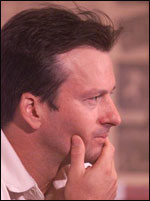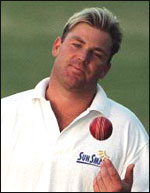Don't shoot the messenger
Daniel Laidlaw
It never ceases to amaze how quickly opinions change in the fickle world of
international sport. A hero one day can quickly become villain the next.
This is never more evident than in the judgement of coaches, whose status is
often determined virtually on the result of their last match.
Mostly it's not such an issue in cricket -- there is usually a captain to
blame -- but coaches are still made to carry a large part of the burden of
defeat while receiving few of the accolades in victory.
A couple of months ago, Australian coach John Buchanan held the rank of
super-coach, a master tactician and innovative leader who possessed a
perfect record in more than a year in charge. He was a revolutionary
reported to use technology extensively, quietly working wonders as the
reserved guy in the background.
After his first series loss in India, and what seemed like his first public
comment after defeat in the second Test, John Buchanan has suddenly become
not the man behind Australia's success, but rather a guy too avant-garde for
his own good who threatens to undermine it. He's been effectively reported
as a destabilising influence, one bad for team morale, who is at odds with one of
Australia's powerful stars in Shane Warne. As an outsider, one initially
feared the clinical Buchanan with his analytical style was not "blokey"
enough to fit in with Australia's matey ethos, but that reservation proved
unfounded as Australia flourished with him on board.
Fortunately Buchanan has the support of Steve Waugh, or at least he did
until publicly criticising Warne after the second Test in India, the
incident that sparked this storm in a teacup. If that did turn Waugh against
him, then it would be quite surprising, since Waugh himself was previously
perceived as a Warne critic, dating back to Warne's axing from the Test team
on the '99 tour of West Indies.
Now, there is the suggestion in a report from England that Buchanan is an
Ashes loss away from being shown the door. What? This is the coach part of,
if not quite responsible for, an unprecedented period of Australian success.
When he took charge, Australia's consecutive victory tally stood at 1, a win
over Zimbabwe, after the Aussies had previously lost to Sri Lanka and drawn
in West Indies in Steve Waugh's first two series as captain.
At that time, Waugh's belief that Australia could win every Test in the
'99-'00 home season against Pakistan and India was seen as a brave call. The
only image the word 'streak' brought to mind then was an unclothed patron
making a dash across the ground.
 From that point, Buchanan presided over 15 successive victories with little
fanfare and certainly no criticism, until publicly questioning Warne's
fitness after his first loss in India, when the leg-spinner returned second
innings figures of 1/152. Whatever the immediate rancour that may have
caused, and it sounds as if it was considerable, it was hardly the kind of
incident to create lasting divisions.
From that point, Buchanan presided over 15 successive victories with little
fanfare and certainly no criticism, until publicly questioning Warne's
fitness after his first loss in India, when the leg-spinner returned second
innings figures of 1/152. Whatever the immediate rancour that may have
caused, and it sounds as if it was considerable, it was hardly the kind of
incident to create lasting divisions.
It is difficult to imagine even Pakistan contemplating sacking its coach
after one series loss following 16 consecutive victories. Although that
won't happen, it is possible Buchanan will be stripped of his role of team
selector while on tour. It is debatable whether the coach should hold this
position, but the grounds for his removal, the outspokenness after the
second Test, would be unfair. Just how important are coaches of
international cricket teams, anyway?
Unlike other sports, cricket teams are already governed by a powerful
leader: the captain. The significance of the role of coach depends heavily
on the team structure. When Bob Simpson was in charge of Australia during
Allan Border's captaincy, the coach was said to be the dominant leader. Now,
Steve Waugh is known to have the ultimate authority in the running of the
Aussie team.
Coaches undoubtedly make a greater impact in certain situations. Buchanan's
influence on Australia may not be that significant. It's difficult to know
from the outside. On the other hand, judging from reports, John Wright's
effect on India has been profound. His disciplinarian approach seems to have
made a positive impression on a talented but under-achieving team.
The fact that Wright is a foreigner should not be lost. Increasingly, this
appears to be a significant asset for an international coach. Where the same
kind of ideas from people of similar background must grow stale after a
while, a foreign influence, with an entirely different approach and
crucially no lingering prejudices, has proven to be effective.
 Kiwi John Wright is one case. Aussie Carl Rackemann, popular in Zimbabwe, is
another. Zimbabwean Duncan Fletcher has been involved in England's
resurgence and Sri Lanka has had its best results under Australian Dav
Whatmore.
Kiwi John Wright is one case. Aussie Carl Rackemann, popular in Zimbabwe, is
another. Zimbabwean Duncan Fletcher has been involved in England's
resurgence and Sri Lanka has had its best results under Australian Dav
Whatmore.
In that context, Buchanan can be viewed as a foreigner to Australia. Unlike
his predecessors Geoff Marsh and Bob Simpson, he did not play at the elite
level, thus presumably carrying no preconceived notions on how the national
team should be run. His modern philosophies and systems were surely
different to what the Australians had previously encountered. His left-field
approach, with reported focus on the person rather than the player, has
spurred his team to new heights of excellence, as Wright has so far done
with India.
Pakistan is another team that stands out as making a wise move in employing
a foreign coach in Richard Pybus. With its state of perpetual politicking
and turmoil, an outsider, independent of all the politics, seemed perfect
for the situation. After so much infighting, Pakistan knew it was time to
bring back a foreigner. Where for whatever reason the Pakistan did not
respond to former great Javed Miandad, who cannot help but have carried old
judgements and relationships into his role as coach, Pybus is completely
fresh, or at least he was when first hired before an inevitable sacking.
Regardless of the life expectancy of a Pakistan coach, one imagines the
outside perspective he provides will be of benefit.
The thinking goes that by the time a cricketer reaches international level
he already knows how to play, and needs a coach to guide and manage rather
than teach or instruct. That makes an outsider perfect for the role. Not a
past national great who feels he must pass on what he knows, but someone
without the involved background who is skilled at personnel management.
That, surely, is the ideal role of the modern coach, one that Buchanan,
among others, fills to perfection.
Criticism of his method on the basis of his first series loss is foolhardy.
John Buchanan on the Indian tour
Mail Daniel Laidlaw